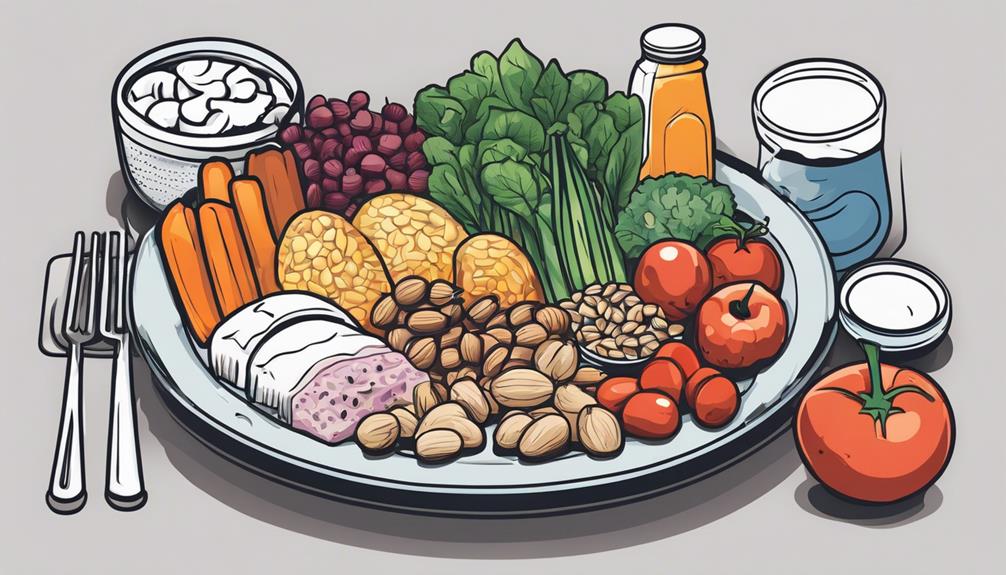Picture a rollercoaster – the sudden highs and lows, twists and turns. Just like that ride, managing blood sugar spikes with diabetes can be a wild journey. But fear not, there are strategies to help you navigate these ups and downs.
From monitoring your carbohydrate intake to incorporating regular physical activity, these tips can make a significant difference in your blood sugar levels. Stay tuned to uncover these practical yet effective ways to keep your blood sugar in check.
Key Takeaways
- Monitor carbohydrate intake and choose low glycemic index foods.
- Practice portion control with carbohydrates and lean proteins.
- Engage in regular physical activity for improved glucose utilization.
- Plan balanced meals with a mix of carbohydrates, proteins, and healthy fats.
Monitoring Carbohydrate Intake
To effectively manage blood sugar spikes with diabetes, monitoring your carbohydrate intake is crucial for maintaining stable glucose levels throughout the day. Portion control plays a significant role in this aspect, as consuming excessive carbohydrates can lead to rapid spikes in blood sugar levels. By being mindful of portion sizes and spreading your carbohydrate intake evenly across meals and snacks, you can help regulate your blood sugar more effectively.
Another essential factor to consider is the glycemic index of the carbohydrates you consume. Foods with a high glycemic index can cause blood sugar levels to rise quickly, while those with a low glycemic index are digested more slowly, resulting in a more gradual increase in blood sugar. Opting for carbohydrates with a lower glycemic index, such as whole grains, legumes, and non-starchy vegetables, can aid in managing blood sugar levels more efficiently.
Emphasizing Fiber-Rich Foods
Emphasize the incorporation of fiber-rich foods into your daily diet to support better blood sugar management and overall health. Fiber plays a crucial role in regulating blood sugar levels by slowing down the absorption of sugar, preventing spikes. Opt for whole grains like oats, quinoa, and brown rice, as well as fruits, vegetables, nuts, and seeds. These foods not only provide fiber but also essential vitamins and minerals beneficial for your health.
When looking to increase your fiber intake, consider fiber supplements as a convenient option. However, it's essential to prioritize whole foods as they offer a broader range of nutrients. Additionally, practicing portion control is key. While fiber is beneficial, consuming too much at once can lead to digestive issues. Be mindful of your portions and spread your fiber intake throughout the day for optimal results.
Incorporating Regular Physical Activity

When it comes to managing your blood sugar levels effectively with diabetes, another crucial aspect to consider is the incorporation of regular physical activity into your routine. Engaging in exercise routines can significantly impact your blood sugar control by helping your body utilize glucose more efficiently.
Aim to include a mix of aerobic exercises like walking, swimming, or cycling, along with strength training activities such as weightlifting or bodyweight exercises. These activities not only improve insulin sensitivity but also contribute to overall cardiovascular health.
Setting specific fitness goals can help you stay motivated and track your progress. Start by establishing achievable objectives, such as exercising for 30 minutes a day, five days a week, or gradually increasing the intensity of your workouts over time. Remember to consult with your healthcare provider before starting any new exercise regimen, especially if you have existing health conditions.
Opting for Lean Proteins
Incorporating lean proteins into your diet can play a significant role in managing your blood sugar levels effectively with diabetes. Choosing the right protein sources and controlling your portions can help stabilize your blood sugar throughout the day.
Here are some tips to help you opt for lean proteins:
- Protein sources: Select lean options such as skinless poultry, fish, tofu, beans, and lentils to provide essential nutrients without excess fat.
- Portion control: Be mindful of your portions to avoid overeating, which can lead to spikes in blood sugar levels. Aim for a palm-sized serving of protein per meal.
- Grilled or baked: Opt for cooking methods like grilling or baking instead of frying to keep your protein lean and healthy.
- Greek yogurt: Incorporate Greek yogurt into your diet as a protein-rich snack or breakfast option.
- Nuts and seeds: Snack on nuts and seeds in moderation to boost protein intake and add healthy fats to your diet.
Balancing Meals and Snacks

To maintain stable blood sugar levels throughout the day, it's crucial to carefully balance your meals and snacks. Portion control plays a significant role in managing blood sugar spikes. When planning your meals and snacks, consider including a balance of carbohydrates, proteins, and healthy fats in appropriate portions. Aim for smaller, frequent meals and snacks to help regulate your blood sugar levels more effectively.
Mindful eating is another key aspect of balancing meals and snacks for better blood sugar management. Take the time to savor and enjoy your food, eating slowly and paying attention to your body's hunger and fullness cues. This can help prevent overeating and regulate blood sugar levels more efficiently.
When choosing snacks, opt for nutrient-dense options such as fruits, vegetables, nuts, and whole grains. These choices can provide sustained energy and prevent drastic blood sugar fluctuations. Remember, balancing your meals and snacks through portion control and mindful eating is essential in maintaining stable blood sugar levels throughout the day.
Frequently Asked Questions
Can Stress and Lack of Sleep Contribute to Blood Sugar Spikes in Individuals With Diabetes?
Yes, stress and lack of sleep can contribute to blood sugar spikes in individuals with diabetes. By practicing stress management techniques like mindfulness and improving sleep hygiene, you can better regulate your blood sugar levels and overall health.
How Does Alcohol Consumption Affect Blood Sugar Levels and What Are Some Tips for Managing It?
You might think alcohol is a friend, but it can mess with your blood sugar levels. To manage it, limit drinks, eat with alcohol, stay hydrated, and consider herbal supplements. Control that sugar, even in social scenes.
Are There Any Specific Herbs or Supplements That Can Help Regulate Blood Sugar Spikes?
To help regulate blood sugar spikes, consider incorporating herbal remedies and supplements into your routine. Alongside dietary changes and exercise, these can support your overall health and management of diabetes. Always consult with a healthcare provider.
What Role Does Hydration Play in Managing Blood Sugar Levels?
Imagine your body as a well-tuned machine. Just like oil keeps an engine running smoothly, proper hydration maintains electrolyte balance crucial for stable blood sugar. Dehydration can lead to erratic blood glucose fluctuations.
How Can Individuals With Diabetes Navigate Social Situations and Special Occasions While Still Maintaining Control Over Their Blood Sugar Levels?
When you're navigating parties or special occasions with diabetes, managing cravings is key. Opt for healthier alternatives, monitor portion sizes, and stay active. Plan ahead, communicate your needs, and don't hesitate to enjoy yourself responsibly.
Conclusion
As you navigate the ups and downs of managing blood sugar spikes with diabetes, remember that you hold the reins to your health. Just like a skilled conductor guides a symphony to harmony, you can orchestrate a balanced lifestyle that keeps your blood sugar in check.
By monitoring your carb intake, choosing fiber-rich foods, staying active, selecting lean proteins, and balancing your meals, you can lead your body towards a harmonious rhythm of stability and well-being.